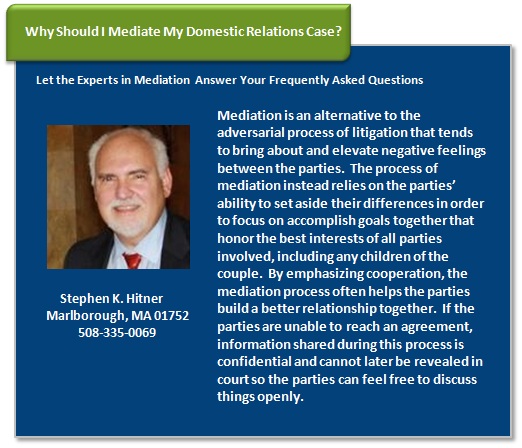 After accumulating items for a potentially significant period of time, many times parties do not agree on how to split up their marital assets. A mediator can help the parties reach a resolution outside of court that satisfies both parties’ interests.
After accumulating items for a potentially significant period of time, many times parties do not agree on how to split up their marital assets. A mediator can help the parties reach a resolution outside of court that satisfies both parties’ interests.
Legal Tests
One effective method that a mediator uses is to explain the law and how the judge might rule on a particular issue given that law. The parties can then compare this possibility with the certainty of whatever type of arrangement they may be able to work out among themselves.
Most states use equitable distribution to divide a couple’s property. Under this set of rules, the judge is left with a lot of discretion to make a division of property that is fair to the parties. Some judges and state laws may begin the analysis by assuming that an equal split is fair. However, there may be factors that move the judge away from this point, such as the length of the marriage, the education of each party, the earning power of each party and the custody arrangement. Some judges may simply order the sale of all of the property and a division of the proceeds. Some states allow the court to award separate property. Some states suggest that each spouse should receive at least one-third of the property while others prohibit a judge from driving a spouse into poverty due to the division. In other states, community property standards apply. These states divide the marital property equally.
Sentimental Value
Another important consideration in the mediation of property is the emotional attachment each party has to it. While the court is not bogged down by this consideration, this aspect can be critical in successfully mediating the case. A party may decide to forego his or her interest in a particular item that means less emotionally in exchange for an item that has a greater sentimental value.





 Alternative dispute resolution mechanisms like mediation and arbitration have been around for years. At the same time, LGBT issues have risen in number and focus over the last several decades. These two worlds have started to merge, allowing for a less contentious process of resolving disputes involving the LGBT community. Some issues that have been successfully handled through these pathways include:
Alternative dispute resolution mechanisms like mediation and arbitration have been around for years. At the same time, LGBT issues have risen in number and focus over the last several decades. These two worlds have started to merge, allowing for a less contentious process of resolving disputes involving the LGBT community. Some issues that have been successfully handled through these pathways include:
 Mediation is an alternative way to resolve virtually any family law case. Due to the often ongoing relationship between the parties and the personal matters at stake, many parties benefit from mediating their domestic relations cases including cases involving:
Mediation is an alternative way to resolve virtually any family law case. Due to the often ongoing relationship between the parties and the personal matters at stake, many parties benefit from mediating their domestic relations cases including cases involving: